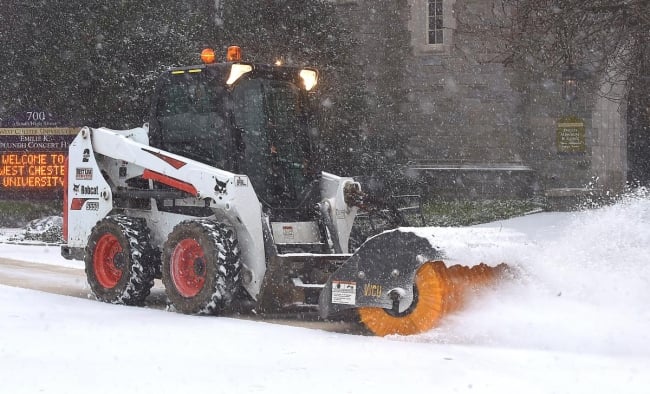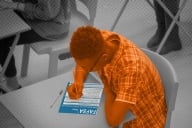You have /5 articles left.
Sign up for a free account or log in.

A snowplow clears sidewalks in front of the Emilie K. Asplundh Concert Hall at West Chester University in December.
MediaNews Group/Daily Local News/Getty Images
In the fall, Assumption University in Worcester, Mass., reviewed its inclement weather policy and decided it would no longer cancel classes during heavy snow. Instead, all classes would be held remotely.
The nor’easter that hit Worcester and the Northeast this week gave Assumption the opportunity to test out its new policy. The university moved to remote-only classes beginning at 1 p.m. Monday through the end of Tuesday.
In previous years, before the pandemic, Tuesday would have been a traditional snow day with no classes for any students. This year, class schedules weren't disrupted.
In many cases, a COVID-19-induced pivot to online learning last spring paved the way for colleges and universities large and small to eliminate or curtail snow days. For example, at Cornell University in Ithaca, N.Y., classes already scheduled to be online are to be held even if the university changes its operating status because of inclement weather -- although exceptions exist if instructors or students would encounter certain difficulties. Cornell students taking in-person classes can even be required to move to online substitutes amid severe weather if an online version already exists and if students have adequate internet access. Cornell wasn't affected by this most recent storm, though, as classes had yet to resume for the spring semester.
Snow days don’t necessarily make sense anymore when instructors have practice moving their classes online. At Assumption, classes are offered synchronously, with instructors teaching students on campus face-to-face and students studying from home tuning in via Zoom.
Students lost some unexpected free time that in past years might have allowed them to engage in snowball fights, hang out with friends or catch up on some reading. But some, at least, appreciated the relative lack of disruption at a time when so much else has been upended.
“I think that normalcy and structure is beneficial during such an abnormal time,” said Lily O’Connor, an undergraduate majoring in Spanish and English who is scheduled to graduate this year from Assumption. “A lot can be missed during a snow day, especially if class only meets once or twice a week.”
Students seem happy to be in class at the moment, said Elizabeth O’Hara, assistant professor of management and marketing at the university.
“I have learned they are happy to see each other, even if it is over Zoom,” O’Hara said. “It is an opportunity to engage and talk, as we would if we were in class.”
While less disruption to course schedules and the academic calendar is a good thing for keeping students on track to graduate, the reality that snow days might become a thing of the past has hit some students hard.
On Twitter, students whose campuses were blanketed with snow this week lamented the fact that they still had online classes to attend. Many said they looked forward to the respite of a snow day every now and then.
“Dear college professors. If it snows and campus is closed. I will not be attending Zoom either. I’m taking my snow day,” tweeted one student at Wilkes University in Pennsylvania, where spring semester classes started as scheduled Monday in a mixture of face-to-face, online and blended formats.
“My brothers have gotten a snow day for the 2nd day in a row and I need to stop thinking that I’m on a snow day because I’m in college and still have class,” tweeted a student at Bowling Green State University in Ohio, which has continued operations as normal this week.
Some faculty members, too, are concerned about the end of snow days, said Mark Rimple, professor of music theory, history and composition at West Chester University in Pennsylvania. If there were no more snow days ever, they would be missed.
“I have seen some worried emails,” he said.
For faculty members with children, it’s difficult to teach and parent at the same time, particularly for single parents, Rimple said. And preparing to teach online can be twice as much work as teaching in person, making a quick transition between modalities in cases of inclement weather challenging, he said.
Still, when snow blanketed West Chester’s campus this week, it was not a major imposition for classes to continue remotely since many classes are already being held online due to COVID-19, Rimple said.
“All instruction had to be remote on Monday and Tuesday, but that was already happening for most classes with the exception of some in-person music ensembles, some science courses and sports team practices, which are all carefully monitored,” he said.
Some institutions have decided to go a different route -- canceling both in-person and remote classes, closing offices and essentially keeping the traditional snow day. Colorado State University laid out plans to cancel classes and close offices as a storm bore down in October, for instance. When the snowstorm hit the Northeast this week, Finger Lakes Community College in upstate New York canceled both in-person and remote classes on Tuesday, following an inclement weather policy decided in October.
“Our primary concern was equity,” said Robert Nye, president of Finger Lakes.
When local K-12 schools decided to close this week, Finger Lakes followed suit. Many students, faculty and staff are parents who would have their hands full with childcare obligations.
A secondary argument in favor of snow days for everyone is that people could use a break, said Nye.
“We have a lot of working students, and everyone is feeling fatigued,” he said.








